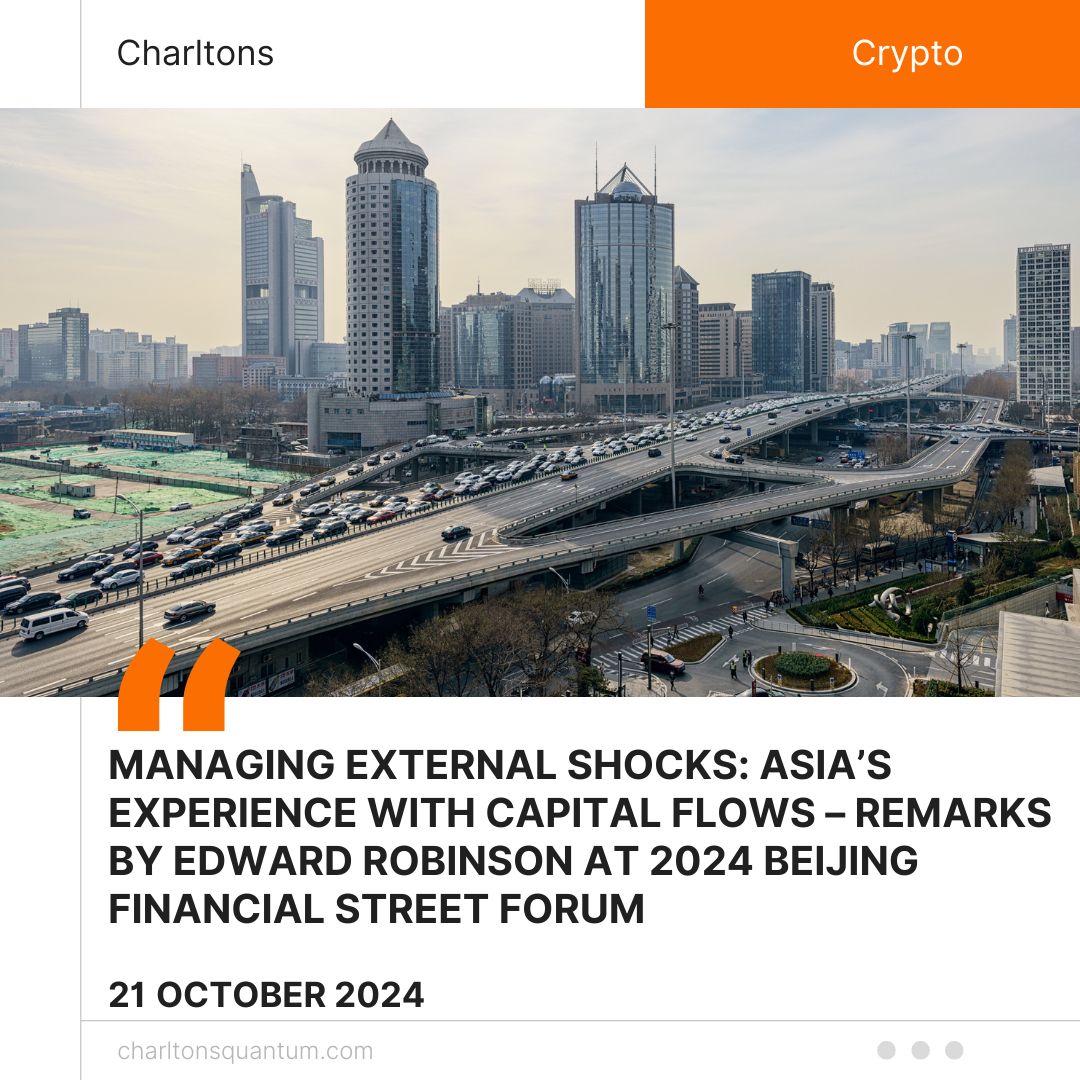
On 18 October 2024, Edward Robinson, Deputy Managing Director (Economic Policy) and Chief Economist at the Monetary Authority of Singapore (MAS), delivered a speech at the 2024 Beijing Financial Street Forum, focusing on the theme of “Improving Modern Central Bank Systems, Enhancing Macro-Governance.” His remarks addressed the evolving challenges and opportunities that Asia’s economies face in managing external shocks, particularly in relation to global capital flows.
Robinson began by reflecting on the shifting dynamics in the global economy, especially following recent negative shocks such as the Covid-19 pandemic, supply chain disruptions, and interest rate hikes in advanced economies. He pointed out that Asia now faces the prospect of easing interest rates, particularly in the U.S. and Europe, which could boost local economies and potentially open up policy space for central banks across Asia to loosen monetary policies if necessary.
He warned that opportunities come with risks, such as the possibility of inflation returning or the threat of a global recession. He discussed the role of capital flows play in transmitting such shocks across economies, especially in Asia, which has historically been vulnerable to volatile inflows and outflows, driven in part by economic conditions in large industrialised economies.
Robinson next elaborated on the concept of the global financial cycle and how it has shaped Asia’s financial landscape. He referred to the phenomenon where global economic conditions, especially in advanced economies, often dominate financial conditions in emerging markets. In the past, Asian economies had little policy autonomy when managing the surges and stops of capital flows, which led to procyclical policy responses that exacerbated financial instability.
In his speech, he noted that the recent tightening cycle offers evidence that Asian economies have gained more latitude in managing these global financial cycles while preserving policy autonomy. Robinson pointed to several factors that contributed to this shift, including synchronised global monetary tightening and the preemptive actions taken by Asian economies to contain inflation. These actions helped stabilise capital flows and avoid the extreme volatility seen in previous episodes.
The MAS economist highlighted the importance of stronger buffers in ASEAN economies during the recent period of monetary tightening. Many ASEAN nations benefited from positive foreign direct investment trends, robust current accounts, and the recovery in key sectors, which helped reduce reliance on foreign capital. Additionally, ASEAN economies made significant strides in deepening their local currency asset markets, allowing for greater domestic participation and reducing vulnerability to external shocks.
Robinson also discussed the role of macroprudential measures in mitigating financial stability risks. Over the years, ASEAN policymakers have expanded their toolkits to curb excess leverage, limit balance sheet mismatches, and manage asset bubbles. When faced with currency depreciation pressures earlier in the year, these economies used discretionary policies, including targeted foreign exchange interventions, to manage currency volatility and capital outflows.
Looking at longer-term trends, Robinson presented findings from recent research by the MAS, showing that the influence of external global financial cycles on capital flows to Asia has significantly diminished over the past 15 years. From 1995 to 2010, nearly half of the variation in capital flows to Asia could be attributed to external factors, but that figure has since dropped to around 10%. This improvement suggests that Asian policymakers now have more room to maneuver in responding to domestic shocks.
Despite these encouraging developments, Robinson cautioned that the global synchronisation of economic variables remains intact. While capital flows may have become less linked to external cycles, other economic factors, such as GDP growth and domestic interest rates, have become more dependent on global financial conditions. This suggests that other transmission channels, such as trades in currency and interest rate derivatives, may now play a larger role in transmitting external shocks to emerging markets.
In addressing policy considerations, Robinson stressed that capital flows do not always respond in a way that brings balance to economies. Instead, short-term yield-seeking behavior and external push factors often drive capital movements. In this context, he argued that inflation targeting, supported by strong fiscal policies, remains a key strategy for managing external shocks, complemented by foreign reserves and liquidity buffers to protect the financial system from sudden outflows.
Concluding his remarks, Robinson highlighted Singapore’s unique approach to managing price and financial stability. The MAS operates with a dual mandate for both monetary and macroprudential policy, with monetary policy focused on price stability and macroprudential policy targeting financial stability. Singapore’s exchange rate-based monetary policy allows for flexibility in managing volatile capital flows, while macroprudential policies prevent excessive credit buildup, particularly in the property sector.
Robinson closed by discussing the importance of international cooperation in securing financial stability. He strongly stated that domestic policies alone cannot shield economies from external shocks, and cooperative measures, such as international swap lines and liquidity support from major economies, play a vital role in mitigating the effects of global financial volatility and stressed that a coordinated approach to macroeconomic, macroprudential, and structural policies is essential for fostering long-term, sustainable growth in Asia.
(Source: https://www.mas.gov.sg/news/speeches/2024/managing-external-shocks)





